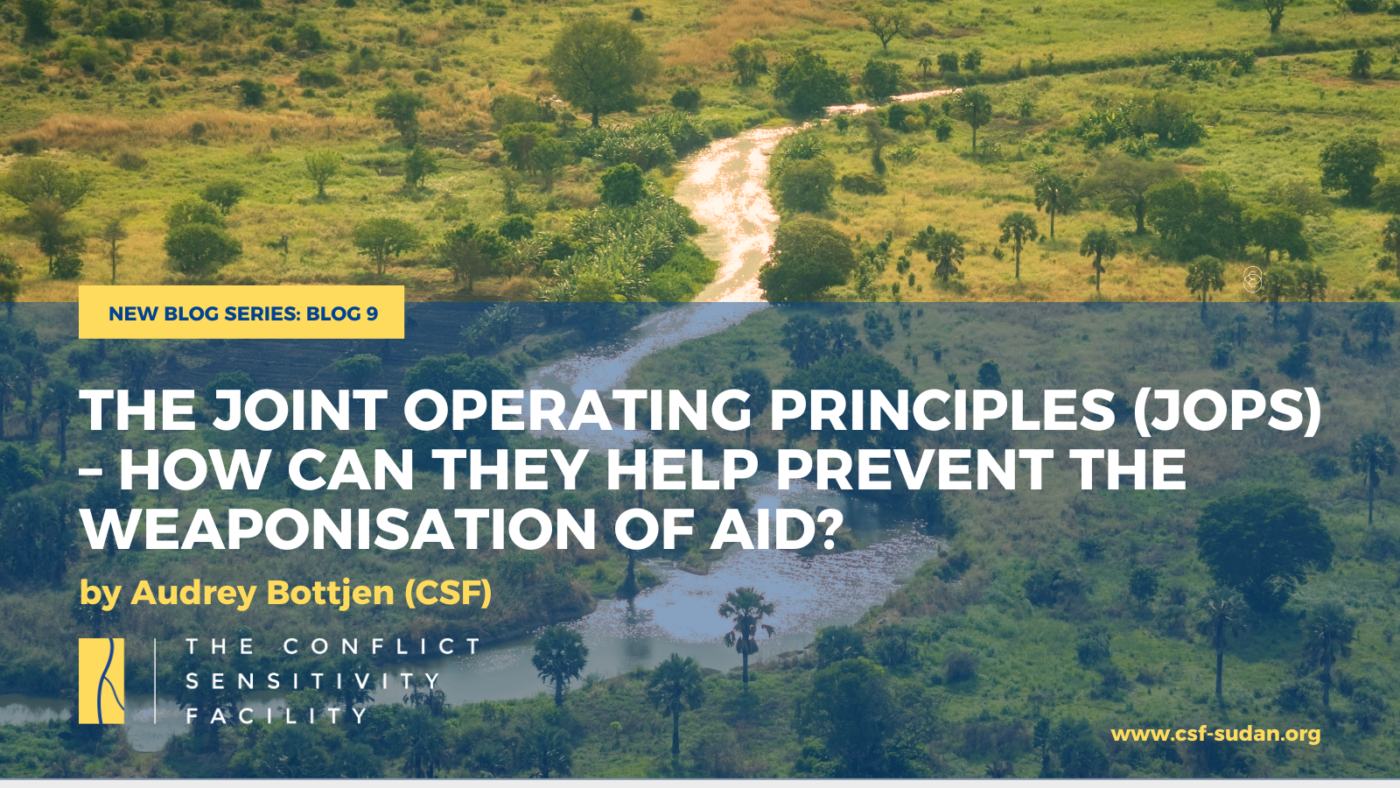
Humanitarian aid is being used as a weapon of war by both main parties to the conflict in Sudan, much as it has been for decades during Sudan’s previous wars. Armed actors control and deny access for military purposes; profit from taxes, rents, leases and fees; and manipulate, steal and loot humanitarian resources – enabling them to benefit from aid’s presence and use aid resources to support their political and military objectives. The Joint Operating Principles (JOPs) are an under-utilised tool for managing these challenges and enabling collective approaches among aid actors to prevent and mitigate the risks of aid inadvertently fuelling ongoing violence.
Principles over compliance
Some loss and manipulation of aid is inevitable when delivering humanitarian assistance in a war zone, and cannot be prevented through compliance measures focused on risk reduction. The costs of draconian compliance regimes can be steep: financially, of course, but also potentially in terms of reduced speed of delivery, risk appetite, flexibility and ability to adapt to complex and changing contexts. Compliance efforts also risk becoming check-box exercises with no teeth and little connection to how the aid sector actually interacts with the war. Risk reduction approaches that focus on punitive, compliance-oriented measures also tend to discourage open discussion of the ways in which aid can be, or is, used by armed actors for military purposes. Zero tolerance for aid misuse often leads not to a reduction of misuse, but to a reduction in the reporting of misuse.
By contrast, approaches that focus on building awareness of and commitment to principles decentralise ownership of aid’s goals and ethics across all levels of the aid system. They encourage open debate about what aid’s values look like in practice and create more opportunities for questioning, problem-solving and collective action. They also enable more and better conversations between aid actors on the ground, the communities they support, and the leaders with whom they negotiate, improving the quality of the quick decisions that field staff make daily at the sharp end of the aid delivery process.
Systems analysts note that changes to principles are among the most effective, but most difficult, ways to promote real shifts to complex systems. In Sudan, the principles that would enable us to better manage conflict actors’ efforts to weaponise or benefit from aid are often pitted against systemic pressures to deliver, spend, and maintain access. Greater investment and commitment to principles is needed to help balance these pressures and reduce unintended contributions to the conflict.
What role can the Joint Operating Principles play?
The Joint Operating Principles (JOPs) were quickly compiled after war broke out in 2023, seeking to identify principles, red lines and ground rules for the aid sector’s engagement in Sudan. As in other complex crises, these principles were introduced by the humanitarian community to address a range of needs – including security, operational, communications, and programmatic – promoting collective approaches to managing internal as well as external challenges to aid’s ethics and values.
The JOPs, however, have not been given sufficient financial resources or political will to play this ambitious set of roles. And there is no evidence that the principles are helping the aid response achieve one of its most important critical conditions: ensuring that aid does not drive or prolong the conflict. This is partly a problem of data, as there is no coherent analysis of where the aid sector is following its principles, where it is not, and why. But better data only gets us so far. We also need to ensure that the principles themselves are fit for purpose, debated and understood by all aid stakeholders (including Sudanese communities), and that they adequately prepare aid actors and organisations to navigate the contexts and the challenges they face.
How can the JOPs be more effective in preventing the weaponisation of aid?
A number of investments and commitments are needed for the JOPs to play a meaningful role in helping aid actors understand the potential for aid to fuel conflict and collectively act to prevent it. We must:
There is growing interest and commitment from different parts of the aid system in Sudan to think more creatively and holistically about the role that principles can play in enabling an aid response that doesn’t feed conflict, but feeds peace. Making progress will require political will, good analysis, resources, time and leadership. These can be expensive and difficult, but they are essential if the aid response is to live up to its values and ensure that its longer-term impact lays the foundations for peace rather than more war.